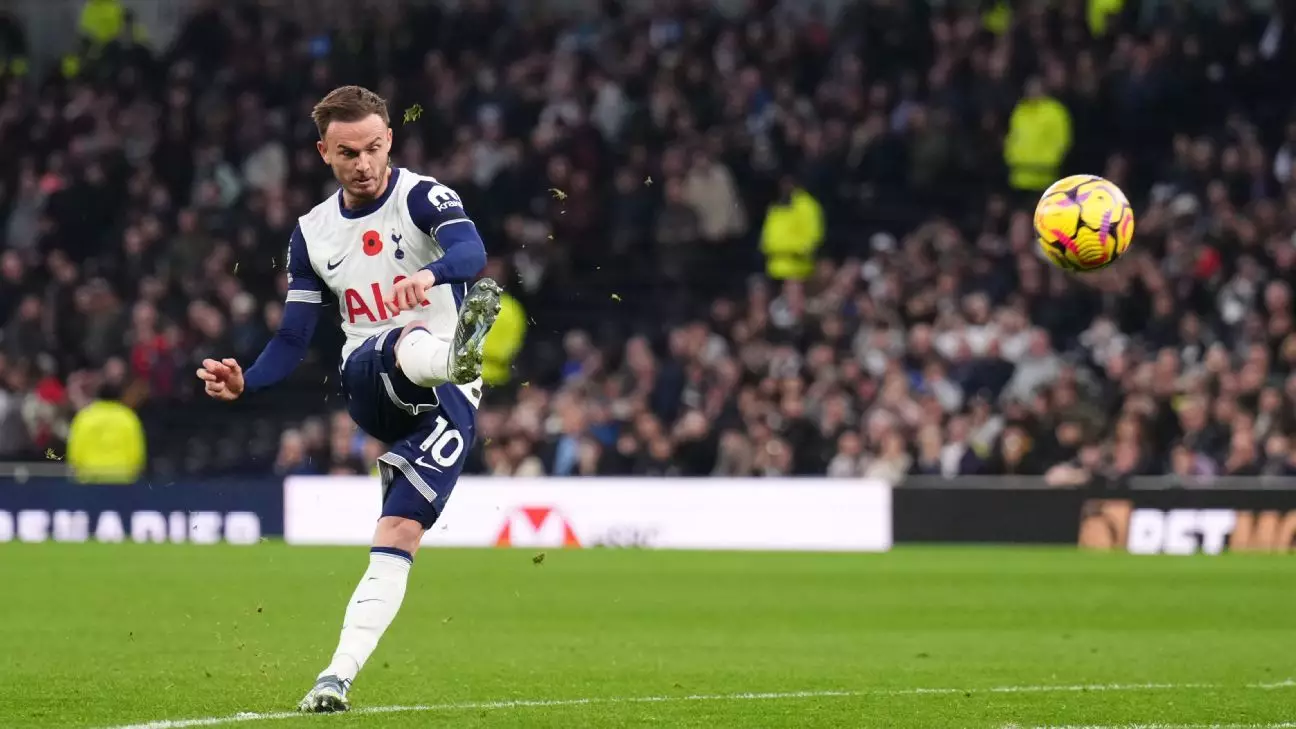James Maddison has entered a pivotal chapter in his football career, one that entwines personal aspirations with the expectations surrounding him. Following a promising start to the previous season, Maddison’s recent form has stagnated, leading to his exclusion from Tottenham Hotspur’s starting XI in critical victories against Manchester City and Aston Villa. His lackluster performance has raised eyebrows, prompting head coach Ange Postecoglou to publicly challenge the midfielder to reclaim the consistency that initially garnered him praise. Yet, amid the pressures of professional football, the quest for recuperation demands not only talent but also the mental fortitude to navigate such challenges.
In recent matches, Maddison displayed fleeting brilliance, including a stunning free-kick in the win against Aston Villa. However, as Postecoglou aptly pointed out, the journey back to international eligibility, especially under the scrutiny of incoming England boss Thomas Tuchel, requires more than just a moment of excellence. Maddison must establish a continuous pattern of impactful performances. The England squad is forged through meritocracy—a landscape where fleeting highlights cannot overshadow the need for sustained contributions.
Delving deeper into Postecoglou’s view suggests a broader reflection on the nature of selection in high-pressure environments. During a recent press conference, he articulated the philosophy that selection for national duty is fundamentally evidence-based. This notion challenges players to produce consistent, compelling performances that make a strong case for their inclusion. The reality is stark; selections are likely determined by tangible results, rather than singular moments of brilliance.
Postecoglou’s statement highlights a crucial aspect of professional sports: the relentless cycle of performance evaluation. The onus rests not solely on managers but primarily on players like Maddison to bring forth the “compelling evidence” that earns them a place in high-stakes matches. For Maddison, this serves as a wake-up call; with England’s international fixtures looming, the urgency to ramp up performance levels cannot be overstated.
Amidst discussions about individual performance and national selection, Postecoglou’s ambitions for Tottenham extend far beyond the immediate allure of trophies. The head coach aims to cultivate **”sustained success,”** a concept that transcends the fleeting joy of winning a single cup. This perspective reshapes the dialogue about Spurs’ historic dry spell in silverware since their 2008 Carabao Cup victory. Postecoglou’s efforts focus on building a legacy, one that emphasizes durability rather than momentary glory.
His acknowledgment that simply winning a trophy does not guarantee long-term success resonates across football cultures. Winning comes with its own set of complexities, and the fragility of triumph can lead to dire consequences if not managed effectively. This perspective is essential for any top club, especially one with Tottenham’s illustrious past and aspirations. The coach recognizes that a shift in mindset is necessary—the notion that trophies can act as a panacea for woes must shift towards a commitment to consistent performance and development.
Echoing his earlier remarks about his teams traditionally finding success in their second seasons, Postecoglou cautioned against prematurely celebrating victories. He illustrated a scenario where winning a trophy might offer a false sense of security—a fleeting success that does not guarantee future stability, potentially leading to further upheaval.
This emphasis on the bigger picture underscores a philosophical paradigm: **sustained achievement is the ultimate goal.** For Tottenham, it is not merely about ending the trophy drought, as tempting as that may be, but rather cultivating a culture that consistently breeds success. With Spurs currently sitting in seventh place in the Premier League, any short-term goals should align with this broader vision of stability and growth.
As Tottenham prepares to face Ipswich Town in their upcoming match, the road ahead for both Maddison and the club reflects the complexities of modern football. The challenge for Maddison is clear: to translate potential into performance that merits a national call-up. Simultaneously, Postecoglou is tasked with building a Spurs team that embraces sustained success.
In a world where individual accolades often overshadow collective achievements, the vision of creating a resilient team culture must prevail. For Tottenham Hotspur, the future hinges on nurturing talent such as Maddison, while focusing on enduring success in all its forms—one match at a time.

Leave a Reply